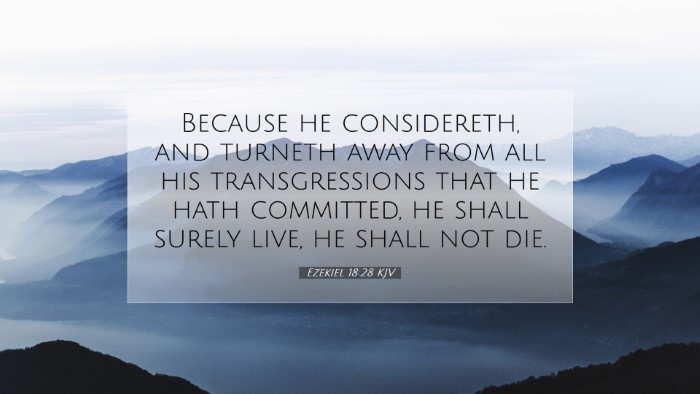Ezekiel 18:28 Commentary
Verse: "Because he considereth, and turneth away from all his transgressions that he hath committed, he shall surely live, he shall not die."
Introduction
This verse from Ezekiel encapsulates a key theme of the Book of Ezekiel—the call to repentance and the assurance of life for the repentant. The context of this chapter deals with divine justice and individual responsibility. The prophet speaks to the exilic community, elucidating the principle that each individual is accountable for their actions before God.
Contextual Analysis
The surrounding verses address the complaints of the Israelites regarding the apparent injustices in God's dealings with them. They believed that their suffering was due to the sins of their ancestors (Ezekiel 18:2). This chapter refutes that idea, emphasizing personal accountability over inherited guilt.
Verse Breakdown
-
“Considereth”
Here, the term implies a deep, reflective thought process. It is not merely a superficial acknowledgment of past wrongs but an earnest contemplation that leads to genuine change. Matthew Henry emphasizes that true repentance begins with an understanding of one's sins.
-
“Turneth away”
This phrase denotes action. Repentance is not a passive state but an active decision to forsake sin. Albert Barnes elaborates that this turning away signifies a conscious choice to abandon sinful behaviors and attitudes.
-
“All his transgressions”
This includes both the overt acts of sin and the underlying attitudes of the heart. Adam Clarke notes that the inclusivity of “all” emphasizes that even the most grievous sins can be forgiven when one genuinely repents.
-
“He shall surely live”
This promise of life is a recurring motif in the Prophets, representing both physical survival and spiritual vitality. The assurance of life is, as Henry notes, contingent upon the individual's repentance, which is an act of faith in God's mercy.
-
“He shall not die”
This statement reinforces the previous promise and serves to eliminate fear from the hearts of the faithful. Barnes emphasizes that death here can be viewed not just as physical death, but as spiritual death—a separation from God’s presence.
Theological Themes
Repentance: The core theme of this verse is genuine repentance. The assurance of life consequent upon repentance illustrates God's mercy and willingness to forgive. Clarke argues that this presents a God who delights in mercy rather than judgment.
Individual Responsibility: The text emphasizes that each person bears the responsibility for their own actions. This correction of the misconception of inherited guilt points to a fundamental truth in God’s justice, as echoed throughout Scripture.
God’s Justice and Mercy: God’s justice is balanced with His mercy. Although judgment is certain for the unrepentant, those who earnestly seek forgiveness find life. This duality reflects God's nature—righteous yet compassionate, holy yet forgiving.
Practical Applications
-
Encouragement for the Penitent:
This verse offers hope to those who feel trapped by their past sins. Pastors can encourage congregants to seek repentance, assuring them of God’s readiness to forgive and restore them to life.
-
Teaching on Responsibility:
In sermons, this text can be used to emphasize the importance of personal accountability. It can serve as a reminder that everyone is responsible for their choices before God.
-
Call to Action:
For theological students, this passage invites introspection about one's own life and practices. It serves as a foundation for understanding the nature of repentance—moving from acknowledgment of sin to a transformative action of turning away from it.
Conclusion
Ezekiel 18:28 powerfully encapsulates the biblical principles of repentance, individual accountability, and the abundant mercy of God. As we reflect on this verse, may we be moved to consider our own sins, to turn away from them, and to embrace the life that God promises to those who seek Him with a contrite heart.
Reflection Questions
- How does this verse shape your understanding of personal responsibility in your spiritual life?
- In what practical ways can you encourage others who struggle with feelings of hopelessness due to past sins?
- What does turning away from transgressions look like in your life personally?


